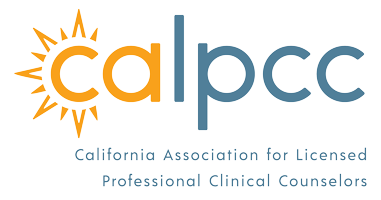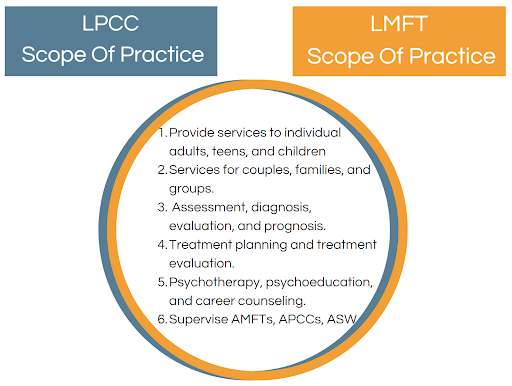Contact Us © CALPCC |
Frequently asked Questions - FAQ
Scope of Practice for the lpcc license
The scope of practice for LPCCs is often misunderstood, as it is a lesser-known license in California. However, the similarities between LPCCs and MFTs are more significant than the differences. As shown in the above Venn diagram, both licenses provide counseling and therapy to individuals, couples, and families. The only limitation for LPCCs in California is that they cannot provide certain types of assessments. For more information, please see the Board of Behavioral Sciences' Statues and Regulations Professional Business Code below. Scope of Practice: Business and Professions Code 4999.20“Professional clinical counseling” means the application of counseling interventions and psychotherapeutic techniques to identify and remediate cognitive, mental, and emotional issues, including personal growth, adjustment to disability, crisis intervention, and psychosocial and environmental problems, and the use, application, and integration of the coursework and training. “Professional clinical counseling” is focused exclusively on the application of counseling interventions and psychotherapeutic techniques for the purposes of improving mental health, and is not intended to capture other, nonclinical forms of counseling for the purposes of licensure. For purposes of this paragraph, “nonclinical” means nonmental health. “Counseling interventions and psychotherapeutic techniques” means the application of cognitive, affective, verbal or nonverbal, systemic or holistic counseling strategies that include principles of 128 development, wellness, and maladjustment that reflect a pluralistic society. These interventions and techniques are specifically implemented in the context of a professional clinical counseling relationship and use a variety of counseling theories and approaches. “Assessment” means selecting, administering, scoring, and interpreting tests, instruments, and other tools and methods designed to measure an individual’s attitudes, abilities, aptitudes, achievements, interests, personal characteristics, disabilities, and mental, emotional, and behavioral concerns and development and the use of methods and techniques for understanding human behavior in relation to coping with, adapting to, or ameliorating changing life situations, as part of the counseling process. |

